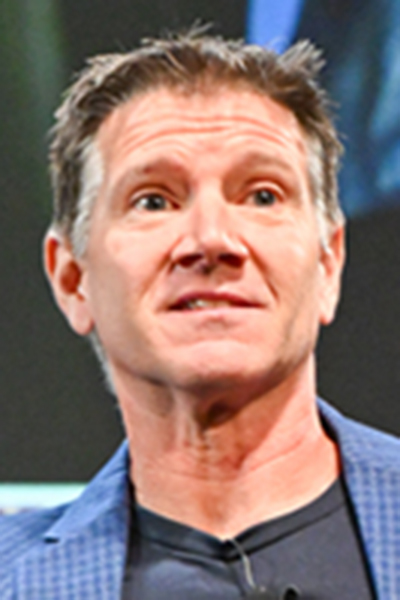
Throughout his life, Sean Swarner has pushed the limits of what many thought possible. Swarner first challenged his mind and body to inspire himself as he faced two different childhood cancers. He then shifted his focus to inspire others, becoming the first cancer survivor to climb Mount Everest—with one working lung, no less.
Swarner delivered the CHEST 2025 keynote address on Sunday, October 19, at the McCormick Place Convention Center in Chicago. CHEST President John Howington, MD, MBA, FCCP, introduced Swarner during the Opening Session, which also included remarks from CHEST 2025 Scientific Program Committee Chair Sandhya Khurana, MD, FCCP, award recognitions, and the annual convocation for new Fellows of the American College of Chest Physicians (FCCP).
“Sean’s story is one of grit, resilience, and hope,” Dr. Howington said. “His journey aligns with our mission at CHEST and with the work we all do every day for our patients.”
Swarner was diagnosed with advanced stage IV Hodgkin lymphoma at age 13 and was told he had only three months to live. When he looked in the mirror, he didn’t recognize himself. He was 60 pounds overweight, and his hair was falling out in chunks. One day in the shower, he fell to his hands and knees, feeling hopeless as more hair fell from his head.
“I remember thinking I had two choices: I could fight for my life or give up and die,” Swarner said. “The latter was not an option. And I also projected into the future three months and pictured my mom, my dad, and my brother without me in their lives.
“That’s when everything changed. That’s when the switch and my perspective changed. I no longer wanted to focus on not dying. I wanted to focus on living. That simple shift in perspective changed my whole life.”
Swarner received a second cancer diagnosis at age 16—this time a primitive neuroectodermal tumor in his chest, also called an Askin sarcoma. The treatments were so harsh that he had to be placed in a medically induced coma for a year. Swarner joked that while some people wish they could forget being 16 years old, he unfortunately cannot remember being 16 at all.
Fortunately, Swarner achieved remission, which he credits to the miracle of modern medicine, family support, and inner will. In college, he pursued a degree in psychology, with the hope of helping other patients with cancer. After college, he began visiting local hospitals all around the world to help inspire and motivate others who were going through similar experiences.
That deeper purpose of serving as an inspiration to others led him to climb Mount Everest, despite people telling him that it would be impossible. He carried the names of people touched by cancer and left a flag at the summit to forever commemorate the struggle of patients worldwide.
“I remember reaching the summit and looking back down at that 13-year-old on his hands and knees, fighting for his life, where his first goal was to crawl 8 feet from the hospital bed to the bathroom. And now he’s standing 29,000 feet on top of the world,” Swarner said.
In closing, Swarner encouraged CHEST attendees to take action the next time life puts a mountain in front of them.
“I’m here to remind you that you’ve already conquered your impossible because every single person here has survived 100% of life’s most difficult challenges,” he said. “So the question next time isn’t, ‘Can you climb?’ It’s, ‘Will you climb?’”

Call for Topics Is Open
Feeling inspired by all the great sessions in Chicago? Help shape the curriculum for CHEST 2026, October 18 to 21 in Phoenix, by submitting topic ideas from areas you’re passionate about, topics affecting your practice, or new technologies you’d like to learn more about. The submission deadline is Tuesday, December 2, at 2 pm CT.


